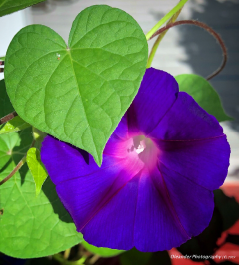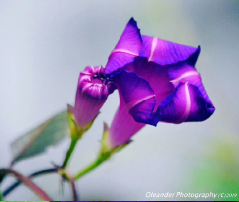See Question
Answer: Morning glory.
Explore This Issue
ACEP Now: Vol 38 – No 12 – December 2019
Ipomoea tricolor, violacea, and others. PHOTO: Jason Hack (Oleander Photography)
Morning glory is often referred to by its variety—including Heavenly Blue, Pearly Gates, Flying Saucers, Blue Star, Summer Skies, and Wedding Bells. This hardy annual climbing vine has single-colored funnel-shaped flowers spaced along its course, with deep green heart-shaped leaves. It blooms in early summer until the first frost.
“Morning” references that the flowers roll themselves closed every evening and unfurl in the morning.
The seeds of many species of morning glory contain a naturally occurring tryptamine, lysergic acid amide (LSA), which is chemically similar to LSD and has similar effects. Seeds are used for their strong psychedelic or hallucinogenic mental effects.
Often, the seeds are crushed and swallowed or made into teas to induce intentional intoxication.

Common names: Heavenly Blue, Flying Saucers, Blue Star
PHOTO: Jason Hack (Oleander Photography)
Apart from the desired hallucinogenic effects, patients often exhibit dilated pupils, increased heart rate, nausea, vomiting, diarrhea, numbness of the limbs, and muscle spasms.
Culturally, the hallucinogenic effects have been ceremonially used by the Aztec people in various rituals, and they referred to the plant as “Rivea corymbose” or “ololiuqui.”
Other South American cultures have used the seeds to diagnose illnesses and foretell various future events.
Interesting Facts
- The Victorian language of flowers uses the morning glory blossom to represent “love in vain.”
- Although morning glory seeds for sale are often coated with methylmercury (an antifungal) to stop abuse, many online retailers will sell them in bulk specifically as “untreated.” Online comment sections are an interesting read for these items.
- There is some evidence that the LSA alkaloid present in morning glory seeds may originate in fungi that grew with the seeds, which became symbiotically entwined with the plant life cycle.



2 Responses to “Toxicology Q&A Answer: Morning Glory”
July 28, 2021
PatrickIt was sweet to read…very concise overall a very enjoyable and informative presentation.
September 1, 2021
Gregory BayneThank You for this information.

I will continue to explore this topic.